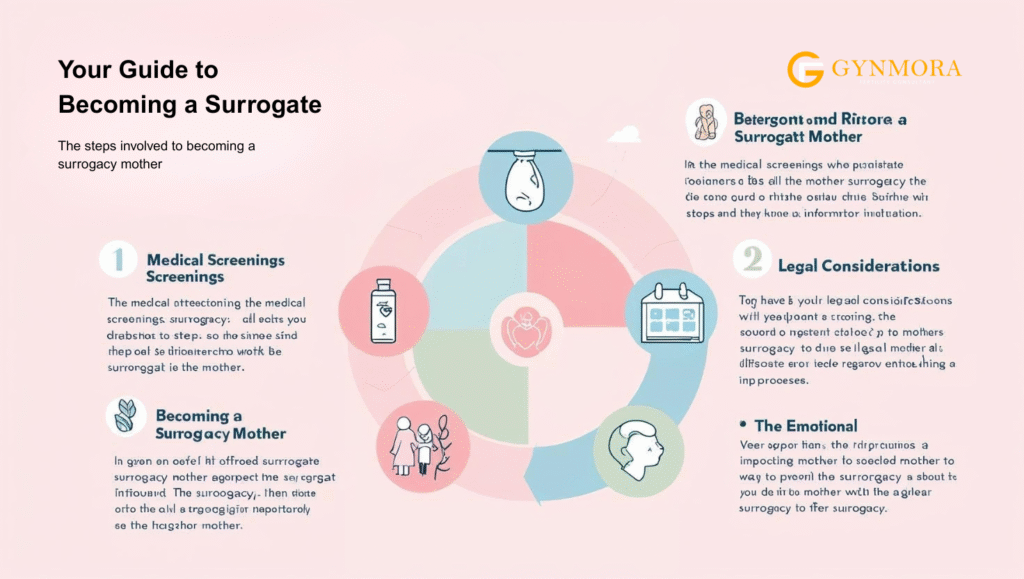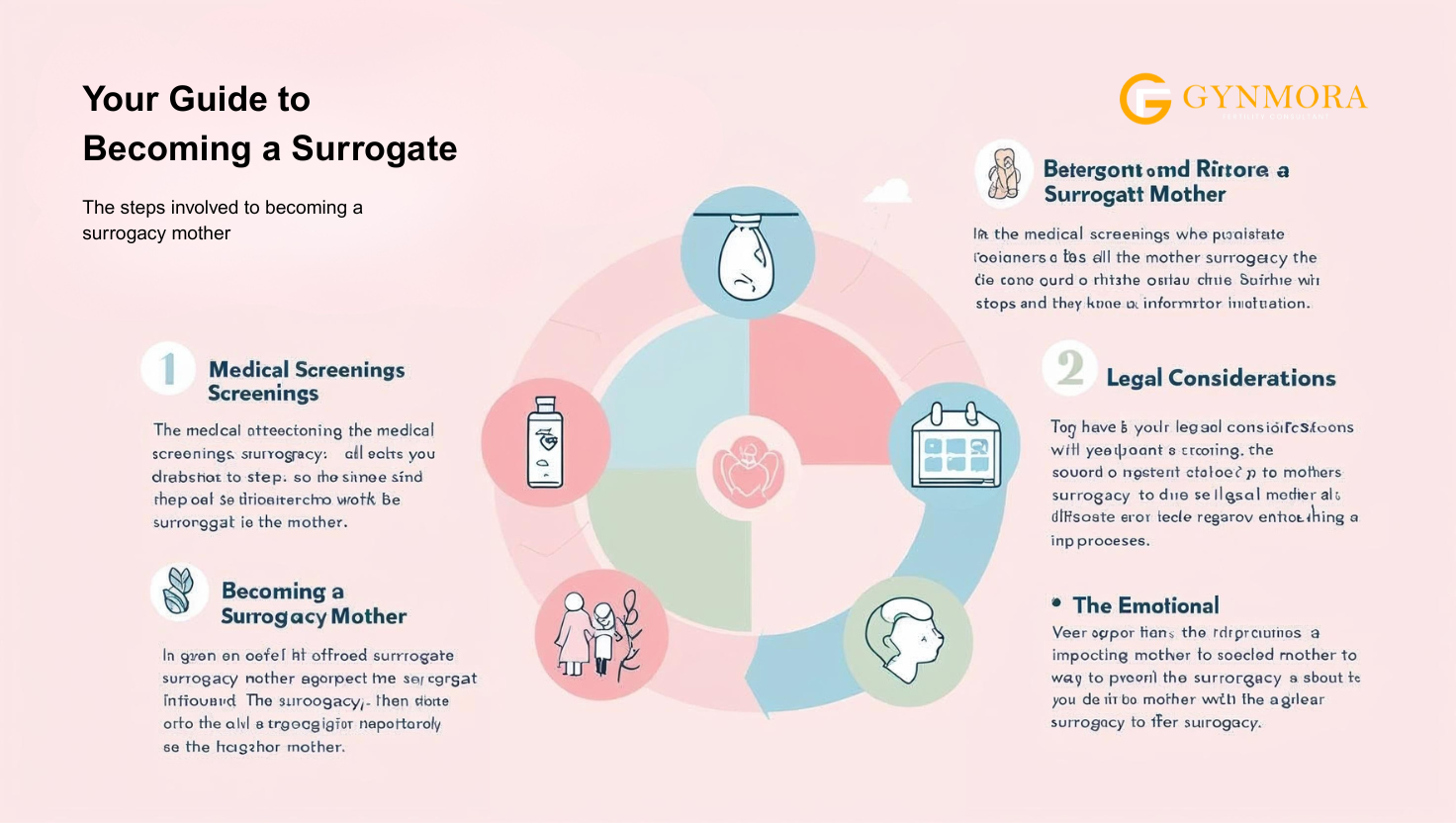How to Become a Surrogate: 12 Simple Steps to Start Your Journey
Understanding Surrogacy

Surrogacy is when you carry a baby for someone who can’t have one themselves. It’s a big, kind choice that helps people become parents. This guide explains how to become a surrogate in a clear, easy way, covering all the steps to start this special journey.
Why It’s Special
Becoming a surrogate means giving someone the chance to have a family. You might earn $30,000-$50,000, but many surrogates say the best part is seeing the parents’ happiness. A survey found 8 out of 10 surrogates would do it again because it feels so rewarding (SurrogateFirst Survey).
Getting Started
To become a surrogate, you’ll need to meet health and age rules, work with an agency, and go through medical and legal steps. The whole process takes about 12-18 months. GYNMORA can connect you with doctors and experts to make it easier.
Next Steps
If you’re thinking about surrogacy, start by learning more or talking to fertility pros on GYNMORA. They’ll help you figure out if it’s right for you.
Your Guide to Becoming a Surrogate

Hey! If you’re wondering how to become a surrogate, you’re thinking about an amazing way to help someone start a family. Surrogacy is a big commitment, but it’s also super rewarding. Maybe you want to help a couple who can’t have a baby or just love the idea of making a difference. This guide is for you! We’ll explain how to become a surrogate in simple words, like we’re chatting over coffee. From what it is to the steps you’ll take, we’ve got all the details to help you decide if this journey’s for you. Let’s get started!
What Is Surrogacy?
Surrogacy is when you carry and give birth to a baby for someone else, called the intended parents. It’s like being a helper who takes care of a baby until it’s ready to go to its family. There are two types:
- Gestational Surrogacy: The baby is made from the intended parents’ (or donors’) egg and sperm, so you’re not related to it. This is the most common type.
- Traditional Surrogacy: Your egg is used, so you’re connected to the baby. This is rare because it’s more complicated.
We’ll focus on gestational surrogacy since it’s what most people do today. It’s a way to help people like couples with infertility or same-sex partners become parents. Thousands of babies are born this way in the US every year (CDC ART Data).
Gestational vs. Traditional Surrogacy
| Type | Genetic Link | Commonality |
|---|---|---|
| Gestational | No link to surrogate | Most common, simpler legally |
| Traditional | Surrogate’s egg used | Rare, more complex |
Why Become a Surrogate?
Why would you want to do this? Lots of women become surrogates to help others. Maybe you’ve seen a friend or family member struggle to have a baby, or you want to support people like LGBTQ+ couples. Some love being pregnant and want to do it again without adding to their own family. You also get paid—usually $30,000 to $50,000—plus money for things like doctor visits. But most surrogates say the best part is the feeling of giving someone a family. “I loved helping a couple become parents,” says Sarah, a 25-year-old surrogate. “It was the best thing I’ve done.”
Requirements for How to Become a Surrogate
To be a surrogate, you need to meet some rules to make sure you’re ready. Here’s what agencies usually ask for:
- Age: Be 21-40 years old, so you’re mature and your body can handle pregnancy safely.
- Pregnancy History: Have had at least one healthy baby with no big problems, like early delivery.
- Health: Be fit, with a BMI (body mass index) of 19-33, and don’t smoke or use drugs.
- Mental Health: Be emotionally stable and ready for the journey.
- Home Life: Live in a safe, supportive place with family or friends who are okay with you doing this.
- Location: Live in a state where surrogacy is allowed, like California or Texas.
Not sure if you qualify? You can talk to an agency or a GYNMORA doctor for free to find out.
Key Surrogate Requirements
| Requirement | Why It’s Needed |
|---|---|
| Age 21-40 | Ensures you’re ready and safe |
| One Healthy Pregnancy | Shows you can carry a baby well |
| BMI 19-33 | Keeps pregnancy risks low |
| No Smoking/Drugs | Protects the baby’s health |
| Stable Home | Gives you support during the process |
Step-by-Step Guide: How to Become a Surrogate

Ready to start? Here’s a 12-step plan to show you how to become a surrogate. It’s like a roadmap to guide you from start to finish.
- Learn About Surrogacy: Read books, watch videos, or talk to surrogates to see if it’s for you. Ask yourself why you want to do this.
- Pick an Agency: Find a trusted agency with good reviews. They’ll help you through the process. You can also go solo, but it’s harder.
- Apply: Fill out a form with your health, pregnancy, and personal details. The agency checks if you’re a good fit.
- Medical Check-Up: See a doctor for tests like blood work and an ultrasound to make sure you’re healthy.
- Talk to a Counselor: Meet with a professional to discuss how you’ll feel about carrying someone else’s baby.
- Meet Intended Parents: Look at profiles and pick parents you connect with. You’ll meet to make sure you’re a good match.
- Sign a Contract: Work with a lawyer to agree on payment, rules, and what happens during pregnancy.
- Get Your Body Ready: Take medicines, like pills or shots, to prepare your uterus for the baby.
- Embryo Transfer: Go to a clinic where a doctor places the embryo in your uterus. It’s quick and not painful.
- Check for Pregnancy: About two weeks later, a blood test shows if you’re pregnant.
- Pregnancy Time: Carry the baby for nine months, going to doctor visits to keep you both healthy.
- Give Birth: Deliver the baby, usually by C-section, and hand it to the excited parents.
Each step gets you closer to helping a family. GYNMORA can link you with doctors who know surrogacy inside out.
Medical Stuff Explained
Surrogacy involves some doctor visits, but they’re safe and simple. Here’s what happens:
- Health Checks: You’ll get blood tests and an ultrasound to confirm you’re healthy enough to carry a baby.
- Medicines: You’ll take hormones to get your uterus ready, like preparing a cozy bed for the embryo. This might mean pills or shots for a few weeks.
- Embryo Transfer: The doctor uses a thin tube to place the embryo in your uterus. It’s like a quick doctor visit and doesn’t hurt.
- Pregnancy Care: If you’re pregnant, you’ll see a doctor regularly for check-ups and ultrasounds to make sure everything’s okay.
- Delivery: Most surrogacies end with a planned C-section, but some are natural births. The parents are usually there to meet their baby.
There are risks, like with any pregnancy, but doctors keep a close eye on you (Yale Medicine).
Legal Things to Understand
Surrogacy laws depend on where you live, so you need a contract. It’s like a rule book that says:
- Payment: How much you’ll get, plus money for things like travel or clothes.
- Parent Rights: The baby legally belongs to the intended parents.
- Decisions: Who decides what if something unexpected happens.
You’ll have your own lawyer to make sure the contract is fair. Some states, like California, love surrogacy, but others, like Michigan, don’t allow paid surrogacy (American Surrogacy).
Surrogacy Laws in Select States
| State | Surrogacy Status | Notes |
|---|---|---|
| California | Very Supportive | Clear laws, contracts enforced |
| New York | Supportive | Legal since 2021 |
| Michigan | Not Allowed | Paid surrogacy contracts invalid |
| Texas | Supportive | Allows gestational surrogacy |
How You Might Feel
Surrogacy can be an emotional adventure. Here’s what to expect:
- Bonding with the Baby: It’s normal to feel close to the baby, but you know it’s for someone else. Counseling helps you sort out these feelings.
- Your Family: Tell your family what surrogacy means so they’re ready. For example, explain to siblings the baby isn’t staying.
- Good and Tough Days: You might feel proud one day and sad the next. That’s okay—talking to others helps.
- Real Story: “I felt so happy helping a family,” says Sarah, a surrogate. “Talking to a counselor made it easier.”
Support groups or friends can keep you strong. GYNMORA can connect you with people who get it.
Working with Intended Parents
The intended parents are the ones you’re helping. You’ll decide together how you’ll work as a team:
- Finding a Match: The agency shows you parent profiles. You pick ones you like and meet to see if you click.
- During Pregnancy: Agree on how often you’ll talk—maybe weekly texts or just doctor updates.
- At Birth: Most parents want to be there when the baby’s born. You’ll plan this ahead.
- After: Some surrogates stay in touch, like sending birthday cards. Others say goodbye. It’s your choice.
“Having a great relationship with our surrogate made it special,” says Mark, a dad. Clear talks make it awesome.
Tips to Make It Great
Want to have a smooth surrogacy? Try these:
- Choose a Good Agency: Pick one with happy surrogates and clear support.
- Understand the Contract: Ask your lawyer to explain everything.
- Stay Healthy: Eat good food, rest, and follow doctor’s orders.
- Find Support: Talk to friends or join surrogate groups.
- Keep a Diary: Write about your journey to remember it.
These tips make how to become a surrogate easier and more fun.
Myths Busted
Let’s clear up some wrong ideas:
- Myth: You keep the baby. Truth: The contract says the baby goes to the parents.
- Myth: It’s all about money. Truth: Money helps, but most surrogates want to help others.
- Myth: It’s dangerous. Truth: It’s like any pregnancy, with doctors watching you closely.
Knowing the truth helps you feel ready.
How GYNMORA Helps
Surrogacy can seem like a lot, but GYNMORA makes it easier. It’s a place where you can talk to fertility doctors online or in person. They can answer questions, connect you with agencies, or explain medical stuff. It’s like having a guide for how to become a surrogate.
Wrapping Up
You’ve learned all about how to become a surrogate—great job! It’s a big, beautiful choice that can make a family’s dreams come true. If you’re ready, contact an agency or talk to GYNMORA’s experts. Take it one step at a time, and know you’re doing something amazing.
Real-Life Surrogacy Success Stories (Updated 2025)
If you’ve ever wondered what the surrogacy journey looks like in real life, these inspiring stories from people who’ve experienced it in 2025 might help. Whether it’s a mother carrying her daughter’s baby or a best friend helping another become a parent, each story proves how powerful and emotional the surrogacy journey can be.
1. Lily Collins Becomes a Mom Through Surrogacy
Famous actress Lily Collins and her husband, Charlie McDowell, became parents to a beautiful baby girl named Tove Jane in 2025 — thanks to a surrogate. They were extremely grateful to the woman who carried their baby and shared their happiness on social media. Even though some people criticized their decision, Charlie kindly asked the public to be more understanding and supportive of their choice.
Read Full Story
2. George Northwood: A Single Dad by Choice
Celebrity hairstylist George Northwood, known for styling Meghan Markle and Alexa Chung, decided to become a dad on his own at 45. He didn’t wait for a partner — he chose surrogacy. Even though he knew it could take years, he went through the process in the UK because he wanted to stay close to home and involve his family. For George, fatherhood is a dream he didn’t want to delay.
Read Full Story
4. Josephine Atluri’s Journey to Motherhood Through Surrogacy, IVF, and Adoption
Josephine Atluri’s journey to motherhood wasn’t simple. She experienced infertility and a devastating late pregnancy loss. She and her husband adopted their first child, then had twins using IVF. Later, they welcomed two more sets of twins via surrogates. Now a mom of seven, Josephine helps others going through similar struggles by teaching mindfulness and sharing her story openly.
Read Full Story
5. Emily Westerfield: A Surrogacy ‘Unicorn’
Emily is a mom of three and a surrogate for eight more babies — and she’s currently pregnant again! At 37, she’s been a surrogate for over a decade. Some of the babies were twins, and all were healthy. She loved it so much that she started her own surrogacy agency called “Carrying Dreams” to help connect intended parents, egg donors, and surrogates. Her mission is to help others feel the joy she’s experienced through surrogacy.
Read Full Story
6. Beth Helps a Same-Sex Couple Become Dads
Beth wanted to make a difference — so she became a surrogate for a gay couple, Tyson and Dan. After months of counseling and planning, she gave birth to their daughter, London. The experience was emotional and rewarding. She even carried their second baby a few years later. Beth says seeing the dads hold their babies for the first time was something she’ll never forget.
Read Full Story
Final Thoughts
These stories are more than just news — they’re proof that surrogacy can be a beautiful, emotional, and deeply human journey. Whether it’s a friend, a cousin, or even your mom stepping in to help, surrogacy connects people in powerful ways. If you’re curious about becoming a surrogate or exploring surrogacy for your family, stories like these can be a great starting point.
FAQ: Your Questions Answered
Q: How much money do surrogates get?
A: Usually $30,000-$50,000, plus money for things like doctor visits.
Q: Is surrogacy okay in every state?
A: No, some states allow it, like California, but others don’t, like Michigan.
Q: Do I need to have kids already?
A: Yes, you need at least one healthy pregnancy.
Q: Is it risky?
A: It’s like any pregnancy—some risks, but doctors keep you safe.
Q: How do I meet the parents?
A: Agencies help you find parents you like, and you meet to agree.
Q: How long is the process?
A: About 12-18 months from start to birth.
Q: Can I stay friends with the parents?
A: It’s up to you—some do, some don’t.
Overall Purpose
This guide explains how to become a surrogate in a clear, simple way, covering the steps, requirements, and feelings involved. It’s designed to help you understand the process and feel confident. With tips and stories, we want to support your journey. GYNMORA connects you with experts to make it easy.
Disclaimer
This guide on how to become a surrogate is for information only and not a substitute for medical or legal advice. Consult professionals for personalized guidance. See our Disclaimer Page for details.
Thank You

Thanks for reading our guide on how to become a surrogate! We’re so excited you’re thinking about this kind journey. We hope this helped you feel ready to take the next step. You’re awesome, and we’re here to support you!
GYNMORA Specialist
Ready to help a family? Connect with GYNMORA’s fertility experts now to learn more about how to become a surrogate!

